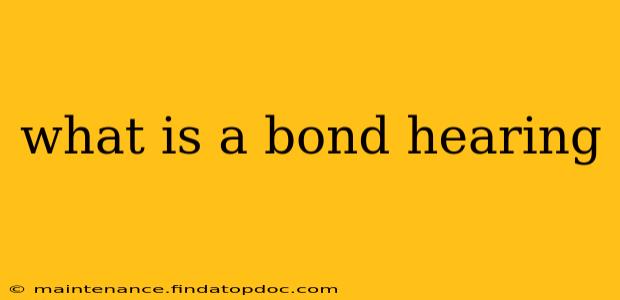A bond hearing, often referred to as a bail hearing, is a crucial legal proceeding that occurs after someone has been arrested. It's the court process where a judge decides whether the accused should be released from custody before their trial and, if so, under what conditions. This decision hinges on balancing the public's safety with the defendant's right to freedom before conviction. Understanding the intricacies of a bond hearing is vital for anyone facing arrest or supporting someone who is.
What Happens During a Bond Hearing?
The hearing typically involves the following steps:
-
Presentation of the Charges: The prosecutor outlines the charges against the accused, detailing the alleged crime and its severity. They may present evidence suggesting the defendant poses a flight risk or a danger to the community.
-
Defense Argument: The defense attorney argues for the defendant's release, presenting evidence that suggests their client is not a flight risk and poses no threat to public safety. They might highlight the defendant's ties to the community, employment history, family situation, and any other factors that support release.
-
Judge's Consideration: The judge weighs the arguments presented by both sides, considering the seriousness of the alleged crime, the defendant's criminal history (if any), and the potential risk to public safety.
-
Bond Determination: Based on their assessment, the judge will make one of the following decisions:
-
Release on Personal Recognizance (ROR): The defendant is released without having to post any money or collateral. This is typically granted for less serious offenses and individuals with strong community ties.
-
Cash Bond: The defendant must pay a specified amount of money to be released. This money is returned upon completion of all court proceedings.
-
Surety Bond: The defendant pays a percentage of the bond amount to a bondsman who guarantees the defendant's appearance in court. The defendant is responsible for paying the full bond amount if they fail to appear.
-
Property Bond: The defendant uses their property as collateral to secure their release. The property will be forfeited if they fail to appear in court.
-
No Bond/Denial of Bond: The defendant remains in custody until their trial. This is usually reserved for serious offenses or defendants deemed a significant flight risk or danger to the public.
-
What Factors Influence a Judge's Decision?
Several factors heavily influence the judge's decision during a bond hearing:
-
Severity of the Crime: More serious charges, such as violent felonies, often result in higher bonds or denial of bail.
-
Criminal History: A defendant's prior convictions can significantly impact the judge's decision. A history of failing to appear in court will likely lead to a higher bond or denial of bail.
-
Flight Risk: The judge assesses the likelihood of the defendant fleeing the jurisdiction before trial. Factors considered include ties to the community, employment, family, and international connections.
-
Danger to the Community: If the judge believes the defendant poses a danger to the public, they are less likely to grant bail or will set a higher bond amount.
-
Evidence Presented: The strength of the prosecution's case and the evidence presented by both sides heavily influences the judge's decision.
What if Bond is Denied?
If the judge denies bond, the defendant remains in custody until their trial. The defense can appeal this decision, but the chances of success depend on the specifics of the case.
Can I Get Legal Representation at a Bond Hearing?
Yes, it is highly recommended to have legal representation at a bond hearing. An experienced attorney can advocate for your release by presenting evidence that supports your case and arguing for the most favorable bond conditions.
How Long Does a Bond Hearing Usually Take?
The duration of a bond hearing varies widely, depending on the complexity of the case and the court's schedule. It can range from a few minutes to several hours.
What if I Can't Afford Bond?
If you cannot afford bail, you may qualify for a public defender or legal aid services. The court may also consider alternatives to cash bail, such as a surety bond or release on personal recognizance. Exploring all available options with legal counsel is crucial in such situations.
This information is for general educational purposes only and does not constitute legal advice. If you are facing a bond hearing, it is crucial to consult with an experienced attorney.
